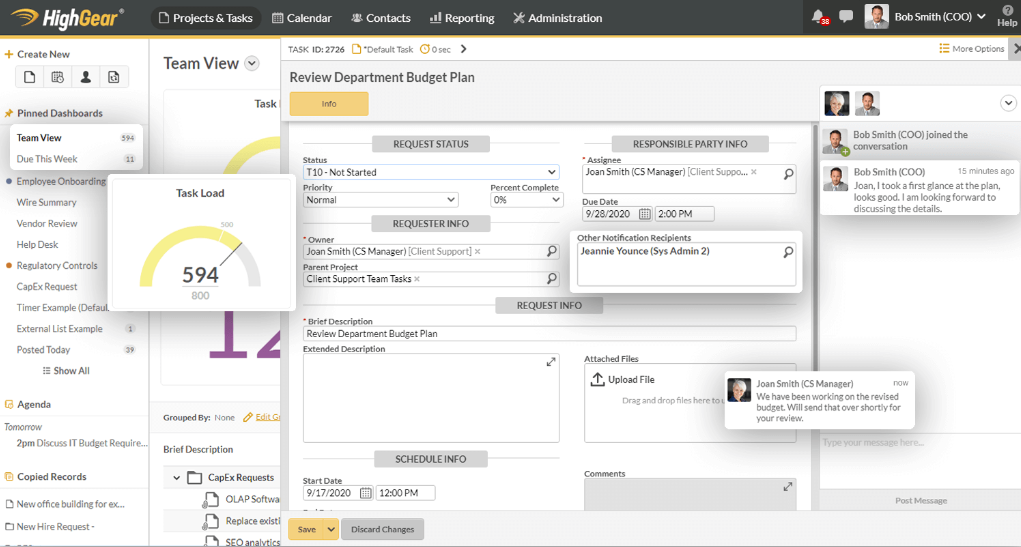
Effective task management is essential for success in today’s dynamic work environment. This systematic approach, which involves handling tasks from initiation to completion, ensures alignment with overall business objectives and maximizes team productivity. It’s a strategic process that goes beyond simple to-do lists, directly contributing to the success of your business.
Whether managing individual tasks, overseeing complex projects, or optimizing workflows, task management plays a critical role in driving successful project completion. This is why businesses and organizations of all sizes nowadays rely on various task management tools and methodologies to handle their workloads as efficiently as possible.
Without a structured approach, too many tasks can overwhelm even the most organized teams, leading to missed deadlines and process bottlenecks. That’s why, in this article, we’ll explain the key principles of effective task management and how businesses of all sizes can benefit from its implementation.
Understanding Task Management
Task management involves planning, tracking, and executing tasks using the right tools and processes. Unlike project management, which encompasses broader project objectives, task management focuses on the granular details that keep a project moving forward.
Simply put, a well-structured task management system enables teams to delegate tasks, track progress, and improve collaboration, keeping team members productive and on the same page.
The ability to manage tasks effectively also makes for a better business practice, as teams can focus more on strategic planning rather than getting bogged down in small, time-consuming details. This is why businesses looking for scalable solutions often turn to business process management tools, which make use of visual workflows, to integrate and streamline their operations.

Why Is Task Management Important?
Task management is the foundation of efficiency and productivity in any organization. Without a structured approach, businesses risk delays, confusion, and misallocated resources, which can negatively impact long-term growth and project success.
Proper task management requires strategic thinking, organizational skills, and the right software tools. When implemented effectively, businesses can experience numerous benefits that contribute to their overall efficiency and project success.
Increased productivity
A well-defined task management system streamlines workflows and reduces redundancy. By automating repetitive processes and minimizing manual tracking, employees can focus on high-priority tasks that contribute to business growth.
Many organizations use workflow automation tools, such as HighGear’s Workflow Assistant, to simplify task assignments and updates, reducing administrative workload.
Enhanced team collaboration
Effective task management fosters a collaborative work environment by keeping all team members aligned on project goals and deadlines. Task management platforms allow seamless communication, document sharing, and real-time task tracking.
Maintaining constant transparency ensures that everyone understands their responsibilities and contributes to the project’s success equally.
Better time management
Time is a critical resource, and poor task management can lead to inefficiencies, not to mention overworked employees, leading to a decrease in workplace morale.
Prioritizing tasks based on urgency and importance allows businesses to allocate resources effectively and maintain steady progress. Digital task management tools enable managers to set deadlines, track task duration, and avoid bottlenecks.
Successful project completion
Every successful project is built on effective task management. Breaking down complex projects into manageable tasks allows teams to focus on individual components without losing sight of the bigger picture.
This ensures that projects are completed on time and within scope, preventing missed deadlines and inefficiencies. By leveraging the right task management platform, businesses can monitor task progress, track project objectives, and manage multiple tasks efficiently.
Mid-size businesses, in particular, can benefit from HighGear’s structured enterprise task management solutions.
Resource optimization and cost reduction
Efficient task management skills allow organizations to allocate human and financial resources efficiently.
Without a structured approach, businesses may overburden employees with too many tasks and fail to optimize their workload. Task management tools help companies distribute tasks evenly among employees, track work hours, and monitor productivity trends to ensure resources are utilized effectively.
Improved accountability and task ownership
Every task in a task management system has a designated owner, reducing confusion and enhancing accountability. Tools that help with tracking tasks ensure that team members understand their assignments and deadlines, leading to a greater sense of ownership over individual tasks.
Platforms such as HighGear’s Enterprise Task Manager provide visibility into team performance, helping managers track progress, delegate tasks effectively, and identify bottlenecks in real-time.
Increased transparency and reporting
Organizations that track tasks effectively have access to valuable insights into their workflows. Task management software often includes reporting and analytics features that allow managers to measure team performance, monitor task completion rates, and identify areas for improvement.
Businesses can then leverage these data-driven insights to refine their processes and enhance long-term efficiency.
Risk mitigation and issue tracking
Unexpected obstacles can impact project progress and deliverables. To mitigate potential disruptions, a robust task management strategy includes risk assessment, contingency planning, and issue tracking.
Identifying risks early on allows businesses to develop proactive solutions before they become big issues.
Reduced procrastination and improved focus
A structured task management system helps employees stay focused by breaking large projects into smaller, more manageable tasks. Automated reminders and task-tracking tools ensure teams maintain momentum and prevent unnecessary delays.
Adaptability and scalability
Whether expanding teams, handling more clients, or managing complex projects, organizations need scalable solutions.
Choosing the right enterprise task management platform will support business growth while ensuring efficiency and agility, even as the workload expands.
Key Features Of Task Management Tools And Software
Choosing the right task management software is essential for optimizing workflow and ensuring successful project completion. Online task management tools provide a central place to track tasks, set priorities, and get real-time updates, replacing outdated and inefficient sticky notes and handwritten to-do lists.

Key features to look for in task management software include:
- Task creation and assignment: Create tasks, assign them to team members, and set deadlines to get work done efficiently. Advanced platforms will also provide details like the provision of resources needed to complete work on an item.
- Task status tracking: See how work is moving along and when tasks are completed.
- Collaboration features: Improve team collaboration through shared task lists, notifications, and notes from previous contributors in the workflow. This ensures no wasted time on getting team members up to speed.
- Automation and integration: Automate repetitive business processes and integrate with other workflow automation software tools like HighGear’s No-Code Development Platform. Automatic workflow trigger prioritization that can escalate or reassign a task without much manual intervention is also key.
- Reporting and analytics: Get insights into project management and progress, resource allocation, and overall team performance to track progress and manage multiple tasks efficiently.
Manual Task Management vs Task Management Software
While traditional manual task management tools like endless spreadsheets and sticky notes may work for simple task lists, they’re not efficient for handling complex projects.
Modern task management software, on the other hand, provides scalable solutions that streamline business processes and support dynamic task planning.
The advantages of using digital task management apps over manual methods include:
- Scalability: Suitable for both small teams and enterprise-level project management, enabling businesses to assign tasks efficiently and manage various processes.
- Real-time updates: All tasks are tracked and updated instantly, allowing for effective progress monitoring and project management across teams and locations.
- Integration with other systems: Integrate with collaboration tools, workflow automation tools, and project planning tools for a seamless workflow.
Choosing The Right Task Management Tool
Selecting the right task manager tool depends on your business needs, team collaboration requirements, and project complexity. Some factors to consider include:
- Ease of use: The right software should allow users to track progress and assign tasks without a steep learning curve. Having all the necessary information in one, streamlined platform is also ideal.
- Customization: Task managers should be able to manage tasks, modify workflows, prioritize critical tasks, and optimize task priority effectively.
- Pricing and ROI: Task management software should provide measurable benefits, such as time savings, improved productivity, and enhanced project progress.
Task Management Best Practices
To get the most from task management, project managers and businesses should adopt the following best practices:
- Prioritize tasks strategically: Determine which tasks need immediate attention and allocate manageable tasks accordingly.
- Utilize collaboration tools: Enhance teamwork by leveraging online task management tools that enable real-time communication.
- Monitor and adjust task progress: Regularly review team tasks and their status, and track progress to keep projects on schedule.
- Automate wherever possible: Reduce manual efforts by integrating workflow automation tools.
- Encourage team collaboration: Ensure that the entire team is aligned on project objectives, strategic thinking, and business processes and can collaborate effectively.
- Leverage analytics for continuous improvement: Monitor productivity trends to refine strategies and improve long-term efficiency.
- Combat procrastination: Ensure team members are trained on essential task management skills and know how to use structured workflows and reminders to maintain efficiency.
FAQs
What are the four elements of task management?
While different frameworks might categorize task management elements slightly differently, here are four core components that are generally considered essential:
- Planning: Defining the task, setting objectives, determining deadlines, and outlining the steps needed for completion.
- Organization: Prioritizing tasks, assigning responsibilities, and gathering necessary materials or information.
- Execution: Following the plan, staying focused, and making adjustments as needed.
- Monitoring and control: Tracking progress, evaluating results, and making necessary adjustments to ensure the task is completed successfully and meets the defined objectives.
What are the main challenges in task management?
Some of the main challenges in task management include:
- Poor planning
- Ineffective communication
- Changing priorities in dynamic environments
- Resource management
- Tracking and managing tasks
- Lack of accountability
- Overwhelm and procrastination
- Resistance to change
Thankfully, task management software can easily help businesses overcome these common challenges.
Conclusion
Effective task management is the backbone of successful project management, ensuring that individual tasks are completed efficiently and projects stay on track.
By utilizing the right task management platform, businesses can achieve objectives, streamline business processes, and enhance collaboration across teams.
For organizations looking to optimize their workflows, HighGear’s task management solutions offer advanced features that enable seamless collaboration and enhanced productivity. Explore HighGear’s solutions and book a demo today to take your project management to the next level.
